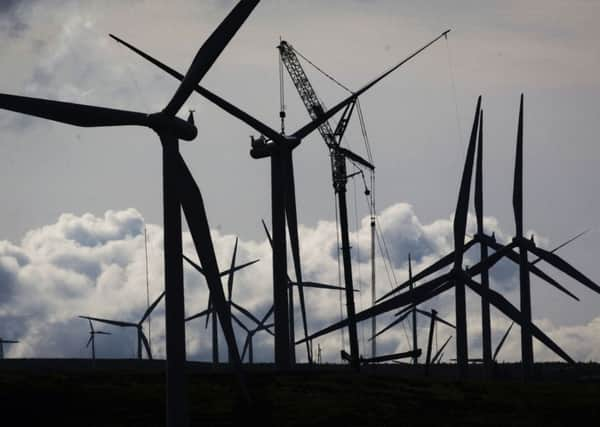How UK’s disgraceful inaction threatens Scotland’s climate change goals – Alan Brown


As we face another record-breaking hot summer, it’s important to remember that the climate crisis we face may also lead to harsher winters. Since most of Scotland’s energy usage comes from heating, energy efficiency doesn’t only go a long way in helping Scotland play its part in tackling the climate crisis, but it helps to keep our household bills down.
Every year, over 3,000 people in the UK die due to inability to afford home heating – the second worst rate in Europe.
Advertisement
Hide AdAdvertisement
Hide AdIt is absolutely unacceptable for people to be forced to choose between having the heating on or cooking their dinner. It is shameful that in 2019 people are going hungry or dying from not being able to afford their heating bills.
Scotland is among only a handful of countries to define fuel poverty, let alone set targets relating to its eradication. The Scottish Government’s recent Fuel Poverty Bill sets strict targets to reduce fuel poverty to no more than five per cent of households by 2040, and links the definition to household incomes and the higher cost of living in rural and island areas.
I was pleased to see a House of Commons report this week praising Scotland’s decision to classify energy efficiency as a national infrastructure priority, and spending four times as much as the Tories at Westminster on household energy efficiency – the highest average annual per capita investment in the UK. By marking it as infrastructure priority, the SNP Scottish Government has embedded efficiency as a structural long-term benefit.
In stark contrast, this same report worryingly warned that if the UK Government doesn’t reform its energy efficiency policy, it has no chance of meeting its climate change targets, including net zero emissions by 2050.
Scotland’s even more ambitious target of reaching net zero by 2045 will also be threatened if Westminster doesn’t take the required action in reserved policy areas.
When it comes to energy efficiency, we once again see a tale of two governments. The Scottish Government’s interest-free loans of up to £15,000 for energy efficiency measures, with heavy subsidies for low-income households, are paying real dividends.
By the end of 2021, the Scottish Government will have allocated over £1 billion since 2009 through energy efficiency programmes to make homes warmer and cheaper to heat.
Right now, the UK Government’s Energy Company Obligation scheme – the only public scheme funding these energy efficient measures in England — is not working for those who need it most.
Advertisement
Hide AdAdvertisement
Hide AdThe Committee on Fuel Poverty found that the three-and-a-half-year programme is predicted to only lower the number of fuel-poor homes in the lowest two energy bands by only two percentage points by March 2022.
The UK Government needs to act now on energy efficiency to reduce carbon emissions and play its part in the fight against climate change.
The Tories – who have reduced their investment in energy efficiency and allowed the rate of installations in England go backwards – is failing the rest of the UK and the rest of the world. Unfortunately, this is not a surprise from a party who in 2015 joyously decided to “cut the green crap”.
The SNP Scottish Government is still waiting on a meaningful response to a letter that set out key actions the UK Government must take in reserved policy areas to enable Scotland to reach its aim of becoming net-zero by 2045.
Tory Ministers have yet to commit to these actions. It is a disgrace that the UK Government is intent on being an obstacle to Scotland’s climate change goals – it is imperative that they wake up and realise the part they must play in protecting our planet for future generations.
It is time the Tories’ rhetoric on climate change was matched by their policies.
A report published yesterday revealed that Westminster support for onshore wind could save each UK household £50 a year – cutting total electricity costs by seven per cent – yet the Tories continue to block onshore wind from competing for government-backed contracts. A wealth of evidence shows that nuclear is no longer financially viable, yet the Tories are dogmatically tied to new nuclear. The disastrous Hinkley development commits to a £92.50/MWH nuclear strike price, compared to offshore wind’s £57, effectively creating an unnecessary increase of 60 per cent.
Carbon Capture and Storage (CCS) could reduce emissions and cross-party MPs have said the technology is needed for UK to meet its energy targets, yet the Tories cancelled a £1 billion investment into CCS in 2015 that could have created 600 jobs in Scotland.
Advertisement
Hide AdAdvertisement
Hide AdBy allowing manufacturing industries to decarbonise, CCS also provides the opportunity to achieve a socially just transition: protecting jobs and avoiding a repeat of the disastrous social impact of 1980s deindustrialisation.
While the Scottish Government is doing excellent work, crucial inaction by the UK Government threatens to risk our ability to get to net-zero. It is time the Tories took a leaf out of Scotland’s book when it comes to tackling climate change, and it could start by making energy efficiency a priority by investing in it and introducing an equivalent to Scotland’s Warm Home scheme.
It is true Scotland has a way to go – but we are moving in the right direction and leading the way on energy efficiency and tackling the climate crisis.
Alan Brown is MP for Kilmarnock and Loudoun and SNP energy spokesperson
